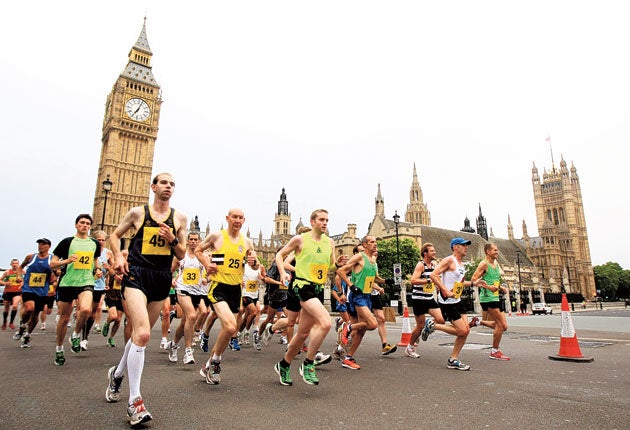How a 52-year-old runner became the London Olympics' first winner
The opening test event for the 2012 Games took place yesterday. Simon Turnbull got up early to watch everything run smoothly

The digital display clock on The Mall reads 5.05am. Barriers stretch down either side of the road from Buckingham Palace to Admiralty Arch, huge Union Flags flying from the top of every lamp-post. Officials in white and red tops are going about their business but, other than them and the pigeons massed on the grass of St James's Park, the only souls around are four men staggering boisterously along the path – on the way home from some club, presumably.
The first test event ahead of the 2012 Olympic Games is just 55 minutes away. In a tent off to the left a group of runners are going through their pre-race motions: stretching, pinning numbers to their vests, sipping from water bottles. These are the first-footers of the 21st Century London Olympics.
"Thanks for giving up your time," they are told as they stand on the start line. "This is a very special moment. In three hours you are going to be Olympians." They all laugh but then hang their heads in respect when asked to observe "a moment of silence" in remembrance of Sammy Wanjiru.
It is a moment heavy with irony and emotion. Unlike this handful of British club runners, the reigning Olympic marathon champion will not get to tread the 26 miles and 385 yards of the 2012 London Olympic marathon course on 12 August next year. The Kenyan leapt to his death from the first-floor balcony of his home two weeks ago. He was 24.
Come 6am the starting gun sounds and the club runners get on their way in the first London Olympic event of any nature since 14 August, 1948, when the closing ceremony of "the Austerity Games" took place under the twin towers of Wembley Stadium.
There is one more-than-interested onlooker. "It's our first test event, which is a sobering thought really," Lord Coe, chairman of the London 2012 Organising Committee, says. "It puts a practical layer on everything. You're off the drawing board here and into the delivery phase. We're an event-management business; we just happen to be delivering the biggest event in the world."
The dummy running marathon men have been told not to race but to "run at a controlled pace". The idea of the test event is to check out the course and the on-site facilities, everything from the portable toilets to the timing system. With the backroom team who have made the London Marathon such a success helping to direct operations, in tandem with the London 2012 Olympic Organising Committee, it is little surprise that everything runs smoothly.
After 2 hours and 57 minutes, a lone runner comes into sight in the finishing straight. Chris Finill crosses the line first, followed 40 seconds later by the rest of the pack, who cross the line en masse.
The scoreboard flashes up "1. C Finill GBR 2hr 58min 00sec." The 38 other finishers are given joint second place, all with GBR next to their names. It is a shame that there are no Olympic medals at stake. With one gold and 38 joint silvers, Charles Van Commenee's target of eight medals from the home athletics team in 2012 would have been surpassed at a stroke.
Finnil, 52, a member of Harrow Athletics Club, has completed all 31 editions of the London Marathon, stretching back to 1981. The rest of the field took the mid-run decision to allow him the honour of becoming the first winner of an Olympic marathon run in London since Delfar Cabrera of Argentina prevailed in the 1948 race.
"I'm not the winner," Finill insists. "I was elected to cross the line first. It was a really nice touch. I feel very honoured."
Apart from Finill and Cabrera, the only athlete to have crossed the finish line first at the end of a London Olympic marathon event was the legendary Dorando Pietri in 1908. Watched by Arthur Conan Doyle, who was reporting for the Daily Mail at the White City Stadium, the little Italian had to be helped across the finish line. He was disqualified but became a figure of global fame.
As for Chris Finill, what next? A small club race somewhere, perhaps? "Actually, my next race will be running across America, from San Francisco to New York," he says. "It's 3,200 miles. I'm hoping to do it in about 75 days."
Join our commenting forum
Join thought-provoking conversations, follow other Independent readers and see their replies
Comments
Bookmark popover
Removed from bookmarks